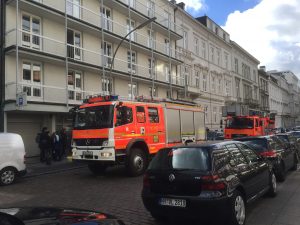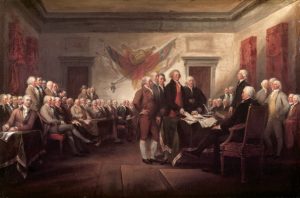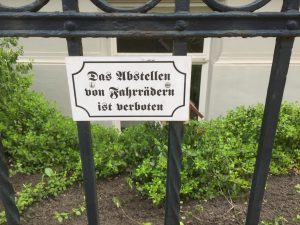On Sunday I make the trek back home. It seems as though I have been away forever and Vibs tells me it seems like twice that long. An entire season (granted, not one of the best in Minnesota) has passed and the landscape will appear much different than when I left. Much more green and much less white and brown. The weather gods seem to be taking some perverse pleasure in teasing me; after an unseasonably cool Spring here in Hamburg, next week promises to be wonderful, with temperatures reaching the mid-60s and more sunshine. May Day, a major holiday here (and across much of the rest of the world) is supposed to be very pleasant.
As many of you will know, last Saturday, Marches for Science were held in more than 600 cities across the world. Hamburg had one and I attended. The rallying point was the plaza in front of the Rathaus and, as you can see from the accompanying photo, the crowd was of a respectable size. The proceedings started with speeches by the organizers (in both English and German) and then a brief address by a professor from the university. Lots of signs and costumes reflecting the numerous issues people felt needed to be addressed rationally. Perhaps needless to say, Trump caricatures were prominently featured. The event carried on despite a stingingly cold rain shower and swirling winds. At two points along the march route the assembly stopped to hear remarks by certain learned folk about the importance of reason and rationality in a time of increasing ignorance and misinformation.
This past week has seen a continuous round of goodbyes and social interactions. I have also been fortunate to encounter more people whose work gives new direction and focus to my own research. For example, a young Italian PhD student at the Center is doing experimental work attempting to re-create ink recipes found in certain medieval Arabic books. We were able to try making prints using the inks she made and the fact that inks used to write with are not so suitable for printing suggests that there may be, somewhere, recipes for printing ink and that would be awesome to find. So much work to do…
On one of my last days at the Center, about mid-morning, we were told we had to evacuate the building. This information was conveyed in person by one of the stalwart student workers who told me that the fire alarm system was temporarily out of order. (I flashed back to the numerous fire drills we endured over the years at Drake, always on the worst weather day of the season, it seemed) In point of fact, there was a small combustion event that had taken place in one of the kitchens (each floor has a small one where there are coffee makers, refrigerators, and tea kettles, no stoves). It turned out that someone unfamiliar with the technology had left a package of paper coffee filters on the heating element of a coffeemaker– with predictable results. So, we had some excitement. No major damage was done and we returned to work with a faint whiff of burnt paper in the air.
Two days to go and suddenly I’m at loose ends. I will start packing today—putting the suitcase out on the spare bed will be a reminder that this chapter is nearly at an end. Sometimes I find it hard to believe that I actually did this, that someone thought enough of my work to allocate a sort of investment to it. Of course, that means I am now under some pressure to produce something and so I must re-order parts of my life to make it happen. Funny how life throws you curves when you least expect it. Time will tell what the result may be. Thanks for reading. Auf Wiedersehen.











